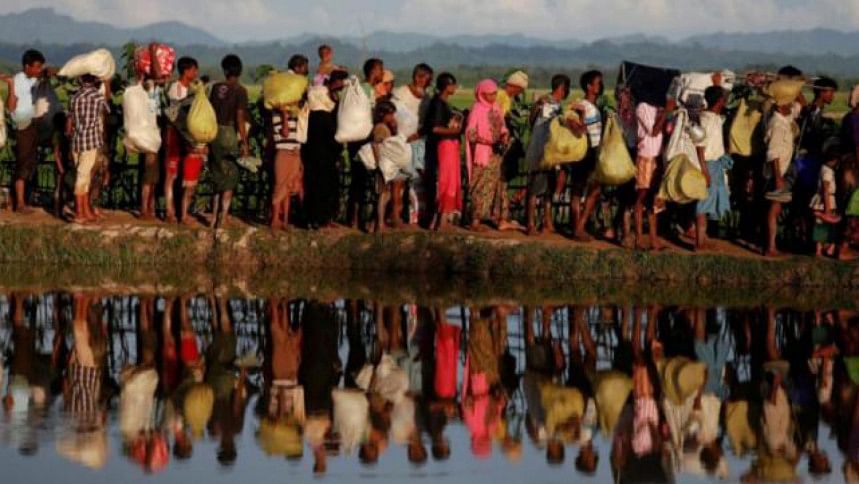Rohingya Refugees: Is repatriation now up in the air?

Rohingya repatriation would now depend on how the international community reacts to yesterday's coup, experts have said.
It has been more than three years since nearly 750,000 Rohingyas, who faced brutal military crackdown in Myanmar's Rakhine state, took shelter in Bangladesh. Despite global pressure, including a genocide case at the International Court of Justice, the Rohingya repatriation did not happen.
The pandemic and Myanmar's elections in November last year led to the delay in the joint meeting between the officials in Dhaka and Naypyidaw. However, early this year a tripartite meeting involving officials from Bangladesh, Myanmar and China was held, and Dhaka expressed optimism of beginning the repatriation in the second half of the year.
Now that the Myanmar military has taken control of the country and detained de facto leader Aung San Suu Kyi and other political leaders of the National League of Democracy (NLD), which had a landslide victory in the November polls, the question is "would it affect the repatriation of the Rohingyas?"
Some experts say the repatriation process may slow down, while others argue that Myanmar military, which led the "genocidal acts" against the Rohingyas, will face more international pressure. They all agree, however, that the Rohingya repatriation would depend on how the global community reacts to the coup.
"I think Rohingya repatriation process will slow down because the military government will be more involved in its administrative and internal issues," said M Humayun Kabir, president at the Bangladesh Enterprise Institute and a former ambassador.
There is a chance, however, that the international pressure on Myanmar military government would mount. China, a close ally of Myanmar, also may come under more pressure as it has been supportive of Myanmar in the global arena, he said.
The Western countries, especially the US and European Union, already have sanctions on the army chief and some others for their involvement in the crackdown on the Rohingyas. They control large businesses in Myanmar, and if these businesses are sanctioned, the military government will be really hurt, Humayun told this correspondent yesterday.
Given that the Biden administration's priorities are democracy and human rights, the US is likely to put stronger pressure, he said.
Bangladesh should fully engage with Myanmar for the repatriation.
There is also a possibility of China and Myanmar working together to start the repatriation to ease pressure from the international community, he said.
Dhaka University International Relations Professor Imtiaz Ahmed said the military always had tremendous influence on Myanmar's political system. Even Suu Kyi, who was in office, had little power of her own in the true sense.
He said the western governments, especially the US, European Union, as well as Japan and India had been saying that Suu Kyi might go deep into the Chinese side if they put pressure on her government, which was moving towards democracy after decades of military ruling.
"Now, with the military taking control, these governments can no more say that. There is a chance that these governments would mount pressure on Myanmar for Rohingya repatriation," said Prof Imtiaz, also director at the Centre for Genocide Studies at DU.
However, if the western governments do not do that and continue to keep relations with the Myanmar military, one has to understand that things will not move, he said.
The foreign relations analyst said the repatriation agreement was signed with the Myanmar government and Myanmar must comply. One needs to remember that Rohingya repatriation in the 1980s and 90's happened during the military regimes in Myanmar. So, the issue cannot and should not be affected.
Jahangirnagar University International Relations Professor Shahab Enam Khan said from Myanmar's perspective, the international actors have so far been playing "ping-pong" since the Rohingya crisis began in 2017. Myanmar has been portrayed negatively. Now, with the military in power, this game is going to stop.
He thinks this change in power does not affect the repatriation process much because the Myanmar military was playing its role from behind the scene even during Suu Kyi's previous regime.
"Bangladesh needs to play a balanced diplomacy, with a focus on how to repatriate the Rohingyas," Shahab said.
Charles Santiago, a Malaysian MP and chairperson of the ASEAN Parliamentarians for Human Right, thinks differently.
He says Myanmar army chief led the "Rohingya genocide" in 2017, while there were conflicts in Chin and Kachin states where minorities were facing persecution.
"The military wants to finish their unfinished job," he said. He fears there might be more influx of the ethnic people to South and Southeast Asian countries, while human trafficking could go up under the military regime.
The international community needs to work sincerely to fix the issues.
All the experts said democracy in Myanmar was in deep crisis and that it would not affect the democracies in the region.
Joyeeta Bhattacharjee, senior fellow at the Delhi-based think tank -- Observer Research Foundation -- said the countries around the Bay of Bengal have democratic values.
"There are certainly difficulties in dealing with a military regime," she said.

 For all latest news, follow The Daily Star's Google News channel.
For all latest news, follow The Daily Star's Google News channel. 



Comments